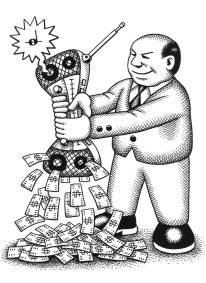« Home | Media Trend Watching: Annoying Banner Ads »
Radio For Sale: The End of Radio Station Super-Sizing
Labels: Acquisitions, Big Media, Consolidation, For Sale, Future of Radio, Media Trend Watching, merger, NAB, Post-Telecom, Privatization, Radio, Radio Stations, Sell, Super-sizing Radio's been hot on the selling blocks lately, with more than two thousand station transactions in 2006 in the U.S. The last time that many stations were sold off was back in 1997.
Radio's been hot on the selling blocks lately, with more than two thousand station transactions in 2006 in the U.S. The last time that many stations were sold off was back in 1997.
The difference?
Then: consolidation merger mania. Now: The post-consolidation end of super-sizing.
Clear Channel leads the "For Sale" movement spinning off lesser market properties while trying to go private. Spanish-broadcasters Univision did go private last June for almost $13 billion. Infinity shed about 35 stations in the past 6 months. Bonneville station swapped with Entercom. And, most recently, Citadel completed its 18-month financial journey purchasing ABC Radio. The last time radio saw this amount of selling action was right after the Telecom Bill of 1996, which changed all the owership limit rules, spurred fast merger and acquisition consolidation and created super-sized radio groups.
The last time radio saw this amount of selling action was right after the Telecom Bill of 1996, which changed all the owership limit rules, spurred fast merger and acquisition consolidation and created super-sized radio groups.
Back then, market values for stations soared as groups raced to get "big" as fast as possible...all in the name of increasing radio's competitive position for ad dollars against other media (or so we were told), damn the consequences.
Ten years later, stations are selling again...but the motivation is different this time around.
"Less is more" might really mean "cluster/group right-sizing".
Instead of station sales creating mega radio groups, radio is scaling back by selling off to smaller groups...or even to brand new small groups. This brings more competition back into radio and creates more-manageable operations, especially in the unrated, small-sized, and mid-sized markets.
Radio needs this retro trend of ownership diversfication, which hopefully can attract fresh creativity and innovative content ideas that work.
Meanwhile, station groups in Canada are being sold off, too...with Astral making a play for Standard and CHUM going to BellGlobal...but there's a difference between radio in Canada and the U.S. Now that we've entered the post-consolidation phase, what did the last ten years bring to radio? There are a small few who made a ton of money, some who made a little and then there's the overwhelming majority -- people who lost gigs and careers (and money) as well as radio listeners who gave up, moving on to different (better) media choices (or, at least away from commercial radio and over to either NPR or new media forms of radio).
Now that we've entered the post-consolidation phase, what did the last ten years bring to radio? There are a small few who made a ton of money, some who made a little and then there's the overwhelming majority -- people who lost gigs and careers (and money) as well as radio listeners who gave up, moving on to different (better) media choices (or, at least away from commercial radio and over to either NPR or new media forms of radio).
Radio remains important and profitable. This new active buy/sell phase is good for radio, leading to smaller major radio groups (as opposed to massive, complex-to-manage divisions).
With all these recent station sell-offs, what bodes for radio's future? Will it improve quality? Minimally, the gap between executive management and the content will shrink somewhat (that's good). Will radio reinvest in creativity and real (not just financial) innovation? Going private and having radio less beholden to Wall Street is also a good thing. But what about that elusive increase in radio's share of total advertising dollars?
And what about radio's issue fighting against the proposed XM/Sirius merger when radio is trying to get its own house in order?
The chart below shows the amount of station selling activity last year:
BIAfn reports:For the first time since 1997 radio station transactions reached levels above 2,000 in 2006, according to the first edition of BIA Financial Network’s quarterly Investing In Radio® Market Report. The breakdown of 1,544 station sales in radio markets (as defined by Arbitron) and 562 unrated areas last year (compared with 1,613 and 637, respectively, in 1997) [led by the proposed privatization of Clear Channel Communications]...demonstrate an interest in the purchase of small market stations as long term investments.
 Is radio making a U-Turn? Is old school sanity returning to radio? Was the consolidation run-up just another merger mania cash grab? Did radio watch "Super Size Me" and decide it needed to reduce to "get healthy"?
Is radio making a U-Turn? Is old school sanity returning to radio? Was the consolidation run-up just another merger mania cash grab? Did radio watch "Super Size Me" and decide it needed to reduce to "get healthy"?
Will former radio leaders run out of the industry due to consolidation find new opportunities to return and reinvest? Will Wall Street continue to downgrade radio? Is the unretirement of Dan Mason a sign of things to come for the industry?
So what is the future of radio? There will be lots to discuss at next week's NAB show in Las Vegas April 14-19.
posted by Unknown @ Sunday, April 08, 2007,
![]()
![]()















